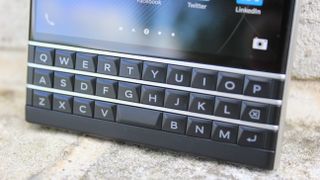Samsung and BlackBerry deny acquistion talks
No Galaxy phones with Classic keyboards, it seems

Update 1: BlackBerry issued a short statement denying it's held talks with Samsung "with respect to any possible offer to purchase" the company.
The Waterloo-based firm said it wouldn't give further comment since it, like many, doesn't comment on rumors or speculation.
Update 2: Now Samsung has chimed in, calling reports it's interested in buying BlackBerry unfounded.
"Media reports of the acquisition are groundless," a company spokeswoman told Reuters. The outlet earlier in the day cited a person familiar with the matter and documents it reviewed when reporting Samsung had wanted to buy BlackBerry for as much as $7.5 billion (about £4.3bn, AU$7.98bn).
Original article below...
If you've ever wanted Samsung to design its Galaxy S6 with a physical keyboard, your dreams may come true.
The company is reportedly eyeing an acquisition of Canadian smartphone-maker BlackBerry in a deal that is valued at as much as $7.5 billion (about £4.3bn, AU$7.98bn), according to Reuters.
Are you a pro? Subscribe to our newsletter
Sign up to the TechRadar Pro newsletter to get all the top news, opinion, features and guidance your business needs to succeed!
If the deal happens, the consumer-centric Galaxy-maker could add more security features to its phones to appeal to both consumers and enterprise users, including bringing BlackBerry's famed keyboards to its range of products.
Bringing the best of BlackBerry to Galaxy
The reported offer to acquire BlackBerry will not only help Samsung gain ground amongst enterprise users, it may also help the company be more competitive against Apple in the consumer segment. With Apple having recently launched Activation Lock to deter thefts of iPhones, a more secure Galaxy experience could ease security conscious consumers who worry about the safety of data stored on mobile devices.
Additionally, with BlackBerry Balance, Samsung's phones could become more attractive to enterprise users in the BYOD space. As users increasingly carry one phone for both work and personal use, BlackBerry Balance helps to securely store work content while giving users the ability to download and run consumer apps.
Until the rise of the iPhone, BlackBerry's devices have been a darling of the enterprise and government space due in large part to ease-of-use, as well as enhanced messaging and security features. Despite market share losses to competing Android and iPhone smartphones, BlackBerry still retains a cult following with its aptly named BlackBerry Classic, the productive powerhouse Passport, and the touch-only BlackBerry Z10 and Z30 phones.
And while BlackBerry's coveted security and enterprise features could land on a future Galaxy S or Galaxy Note series phone, the benefits may also extend to Samsung's nascent Tizen devices.
Though this isn't the first time we've heard of a potential BlackBerry buyout, if accurate, the deal also brings BlackBerry's industry-leading smartphone keyboards to Samsung, as Samsung would also gain access to BlackBerry's patents.
BlackBerry's decline
BlackBerry's failure to adapt to the consumer market when the iPhone launched in 2007 had cost the company its leadership position. The company saw its user base erode with the failure of the BlackBerry Storm's click screen, an app store that was lacking in content, and features - such as lackluster cameras - that did not cater to an evolving multimedia-centric world.
Fighting for a turnaround under current CEO John Chen, BlackBerry attempted to cut cost by reducing its workforce, laying off as many as 4,500 employees in September 2013, or roughly 40% of its staff. The company is also partnering with Foxconn to reduce manufacturing costs.
Most recently, BlackBerry opened up its popular BBM messaging platform to users on rival iOS, Android, and Windows Phone platforms to compete against popular services like Facebook Messenger and iMessage. In November, BlackBerry also announced that it was partnering with Samsung to provide end-to-end security for Android.
